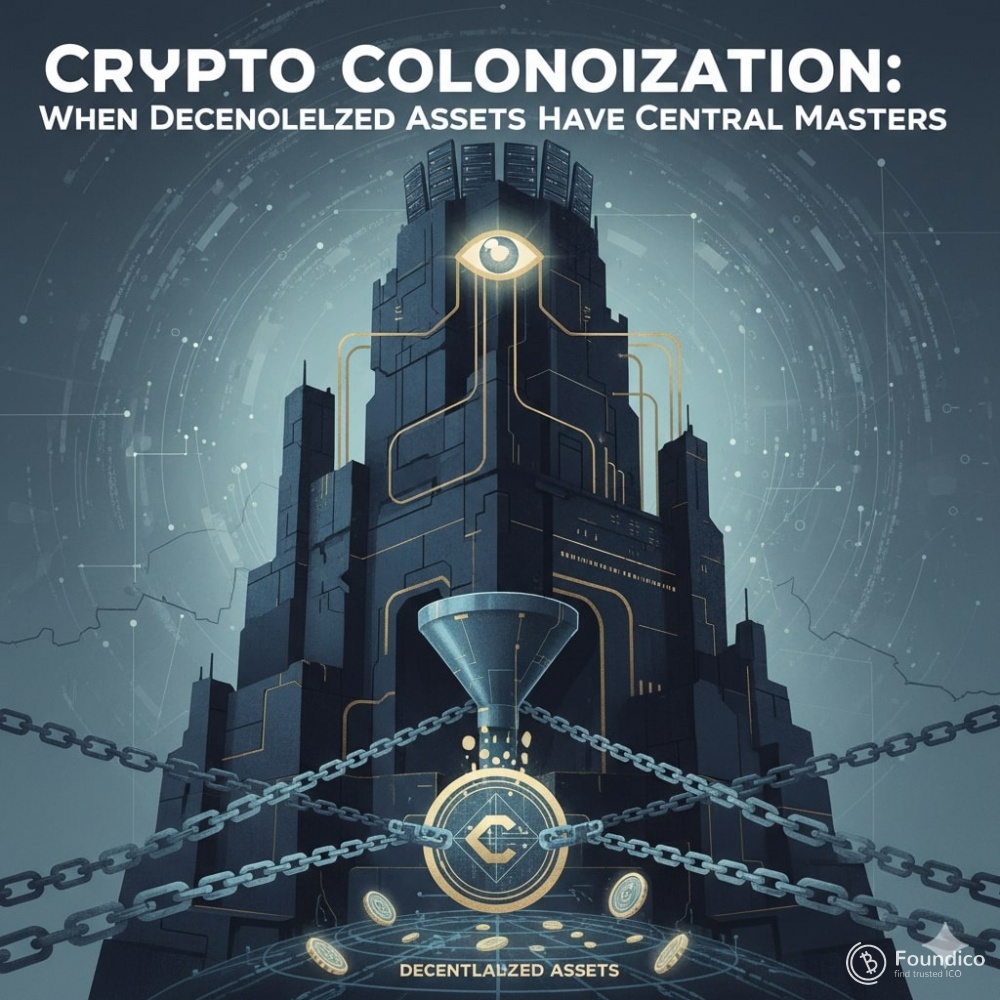Crypto Colonization: When Decentralized Assets Have Central Masters

By Dr. Pooyan Ghamari, Swiss Economist and Visionary Author
The promise of cryptocurrency and blockchain technology was liberation: liberation from central banks, from financial intermediaries, from censorship, and from the arbitrary rules of traditional power structures. It envisioned a world where individuals had sovereign control over their assets, engaging in peer-to-peer transactions on truly decentralized networks. Yet, as a Swiss economist observing the rapid evolution of this space, I see a disturbing trend emerging: a new form of "Crypto Colonization." This phenomenon occurs when supposedly decentralized assets and protocols fall under the de facto control of central masters, undermining the very principles they claim to embody.
The New Colonial Powers
Crypto colonization doesn't manifest as military occupation or the physical subjugation of territory. Instead, it operates through more subtle, yet equally potent, mechanisms of influence and control within the digital realm. The new "colonial powers" are not nation-states in the traditional sense, but often large corporations, powerful investment funds, centralized exchanges, and influential development teams.
Here are the primary vectors of this colonization:
1. Centralized Custody and Gatekeeping
The most overt form of crypto colonization occurs when users, for convenience or perceived security, entrust their "decentralized" assets to centralized custodians. This includes major cryptocurrency exchanges (CEXs) and custodial wallet services. While you might "own" Bitcoin or Ethereum, if it sits on an exchange, you do not control the private keys. The exchange does. This effectively re-establishes the very intermediary dependence that crypto aimed to dismantle. Your assets are no longer truly peer-to-peer but are held in a digital vault controlled by a corporate entity, subject to its terms of service, potential hacks, and regulatory pressures.
2. Protocol Governance by the Few
Many blockchain protocols, particularly those utilizing Proof-of-Stake, rely on token holders to vote on critical network upgrades and governance decisions. In theory, this is democratic. In practice, however, a disproportionate amount of voting power is often concentrated in the hands of a few large holders—early investors, venture capital firms, or even the protocol's own founding entity. This creates an oligarchy of token wealth, where decisions that affect the entire network (from fee structures to fundamental protocol changes) are effectively controlled by a handful of central masters who dictate the future of a supposedly decentralized system.
3. Infrastructure Centralization
Even for genuinely decentralized protocols, the underlying infrastructure can become a point of colonization. The reliance on a few dominant cloud providers (e.g., AWS, Google Cloud) for hosting nodes, or the consolidation of mining power into a few large pools, creates single points of failure and control. If these central infrastructure providers decide to censor, shut down, or collude, the "decentralized" network becomes vulnerable to their will. The same applies to crucial dApp infrastructure like Infura or Alchemy, which, while providing critical services, centralize access points to decentralized networks.
4. Narrative and Development Control
The "thought leadership" and development roadmap of many projects can also be highly centralized. A small group of core developers, often funded by specific entities, can dictate the technical direction, prioritize certain features, and even shape the public perception of what the project should be. This colonization of narrative and development can subtly steer a project away from its original decentralized ideals, aligning it more closely with the interests of its central masters.
The Consequences of Crypto Colonization
The dangers of this crypto colonization are significant:
-
Loss of Sovereignty: Users lose true control over their assets and their digital future.
-
Vulnerability to Censorship: Centralized entities can freeze accounts, block transactions, or comply with government requests, negating censorship resistance.
-
Systemic Risk: Concentration of power creates single points of failure, making the entire ecosystem vulnerable to the actions or failures of a few.
-
Erosion of Trust: The fundamental promise of trustlessness is undermined when reliance on trusted third parties is re-introduced.
Resisting the New Colonialism
To truly realize the revolutionary potential of blockchain, we must actively resist crypto colonization. This means:
-
Prioritizing Self-Custody: Educating users on the importance of holding their own private keys.
-
Promoting Decentralized Governance: Developing and advocating for more equitable and distributed governance models that prevent undue influence by a few.
-
Diversifying Infrastructure: Supporting efforts to decentralize infrastructure beyond dominant cloud providers and mining pools.
-
Democratizing Development: Fostering open-source development and diverse contributors to prevent narrative and technical capture.
The battle for true decentralization is ongoing. If we are not vigilant, the very tools designed to liberate us could inadvertently become instruments of a new, digital colonialism, where our decentralized assets ultimately serve central masters.

 BitcoinHyper - Bitcoin Hyper finally unlocks fast and cheap Bitcoin transactions by delivering the first ever Bitcoin Layer 2 blockchain.
BitcoinHyper - Bitcoin Hyper finally unlocks fast and cheap Bitcoin transactions by delivering the first ever Bitcoin Layer 2 blockchain.